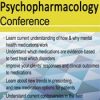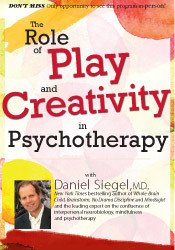Daniel J. Siegel – The Role of Play and Creativity in Psychotherapy with Daniel Siegel, MD
$200 Original price was: $200.$75Current price is: $75.
Shopping Instructions:
- DISCOUNT 15% : SHOP15
- Product Delivery: Within 1 – 12 hours after purchase.
You’ll learn how you can use play for the clinical evaluation of a child, adolescent, or adult, because how a person plays reveals ways in which mental well-being may be present or impaired.
Daniel J. Siegel – The Role of Play and Creativity in Psychotherapy with Daniel Siegel, MD
Despite your best efforts and applying various tools in the toolbox of “therapy techniques”, do you continue to struggle with some clients?
Do you wonder if there’s some new approach that you can integrate to make better headway?
By incorporating Play and Creativity in your work, you can improve treatment outcomes with your clients.
Learn how to incorporate Play and Creativity into your practice. Dr. Siegel is the New York Times bestselling author of Whole Brain Child, Brainstorm, No Drama Discipline and Mindsight and the leading expert on the confluence of interpersonal neurobiology, mindfulness and psychotherapy.
You’ll learn how you can use play for the clinical evaluation of a child, adolescent, or adult, because how a person plays reveals ways in which mental well-being may be present or impaired. You’ll discover how easy it is to incorporate play techniques and other creative approaches such as rhythmic movement, non-verbal alignment, improvisation and musical vocalizations into your practice.
To give you even more practical application, Dr. Siegel will demonstrate play activities that are used with huge success in the treatment of:
- PTSD
- OCD
- Anxiety Disorders
- Depression
- Discuss the role of play in the development of mental well-being in clients.
- List four forms of play and their treatment implications.
- Contrast a state of trust from a state of wariness in clients.
- Identify how client attachment patterns shape the drive for exploration.
- Summarize three ways in which uncertainty is necessary for play in a clinical setting.
- Name four ways to incorporate creative play in psychotherapy.
Would you like to receive Daniel J. Siegel – The Role of Play and Creativity in Psychotherapy with Daniel Siegel, MD ?
Play
-
How attachment relationships create the space for play
-
Neural integration, play and self-regulation
-
Trust, social engagement and play
-
Forms of play
Development of Play Across the Lifespan
-
Developmental trauma and its impact on trust and play
-
Abuse, neglect, and attachment
-
Traumatic attachment, unsolvable fear, and impaired play
-
Dissociation as a developmental result of trauma
The Fundamentals of a Creative Psychotherapy
-
The PART we play as therapists
-
Healing power of presence
-
The Polyvagal Theory and social engagement
-
Play and imagination within dyadic integration
-
Trust and the social engagement system of the brain
Play and Creativity
-
Space for inner directed exploration of the internal and external worlds
-
Find time to play and the freedom to create
-
Thriving with uncertainty
-
The pleasure of play builds upon itself
Play and Therapy
-
Energy and Information in new combinations
-
Use the a playful mind to change a chaotic or rigid brain
-
The central role of consciousness and neuroplasticity in the process of therapy
-
The self-organizing aspect of play in therapy
-
How creativity and play change a brain
Interventions and Play Activities
-
PTSD
-
OCD
-
Anxiety Disorders
-
Depression
A Playful Interpersonal Space in Psychotherapy
-
Respect and Trust
-
Embrace the power of uncertainty
-
Cultivate and reignite the creative imagination
-
Relational and neural integration at the heart of resilience and healt
Related products
NLP & Hypnosis
NLP & Hypnosis
NLP & Hypnosis
NLP & Hypnosis
NLP & Hypnosis
NLP & Hypnosis
NLP & Hypnosis












